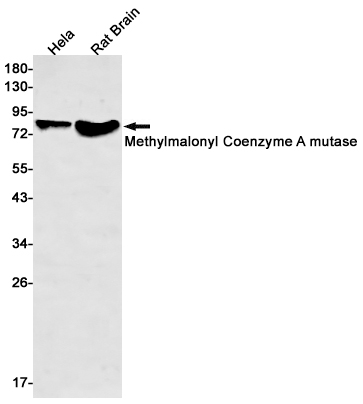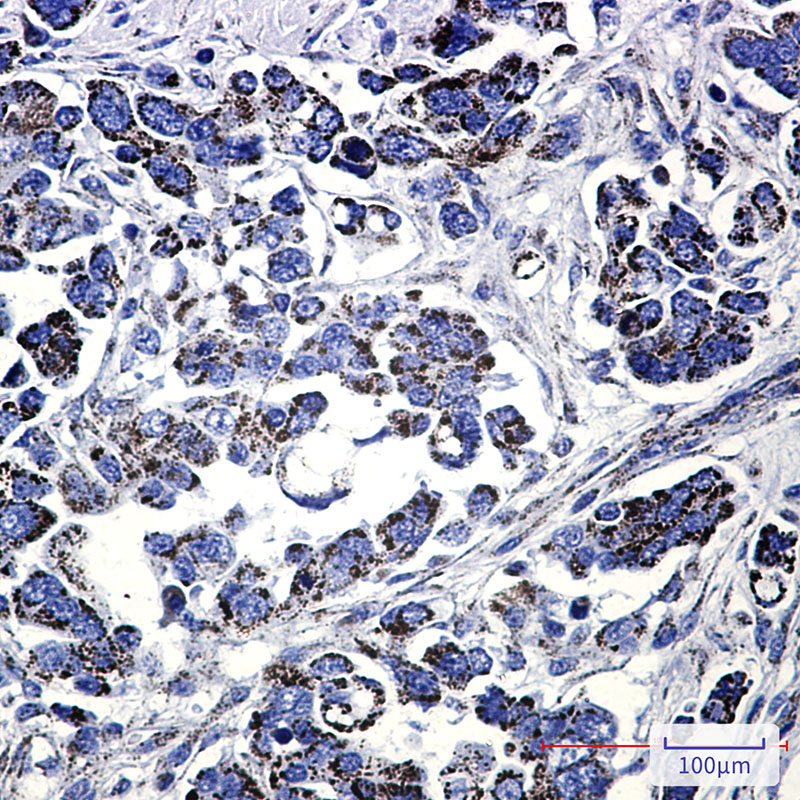

| WB | 1/500-1/1000 | Human,Mouse,Rat |
| IF | 咨询技术 | Human,Mouse,Rat |
| IHC | 1/50-1/100 | Human,Mouse,Rat |
| ICC | 技术咨询 | Human,Mouse,Rat |
| FCM | 咨询技术 | Human,Mouse,Rat |
| Elisa | 咨询技术 | Human,Mouse,Rat |
| Aliases | MCM |
| Entrez GeneID | 4594 |
| WB Predicted band size | Calculated MW: 83 kDa; Observed MW: 83 kDa |
| Host/Isotype | Rabbit IgG |
| Antibody Type | Primary antibody |
| Storage | Store at 4°C short term. Aliquot and store at -20°C long term. Avoid freeze/thaw cycles. |
| Species Reactivity | Human,Rat |
| Immunogen | A synthetic peptide of human Methylmalonyl Coenzyme A mutase |
| Formulation | Purified antibody in TBS with 0.05% sodium azide,0.05%BSA and 50% glycerol. |
+ +
以下是关于Methylmalonyl-CoA Mutase(MCM)抗体的3篇代表性文献及其摘要概述:
---
1. **文献名称**:*"Production and characterization of monoclonal antibodies against human methylmalonyl-CoA mutase"*
**作者**:Fucharoen S, et al.
**摘要**:该研究报道了针对人源MCM蛋白的单克隆抗体制备及特性分析。通过免疫小鼠获得抗体,验证其对重组MCM蛋白的特异性结合能力,并成功应用于Western blot和免疫组化检测,为遗传性甲基丙二酸血症的诊断提供工具。
2. **文献名称**:*"Immunoblot analysis of methylmalonyl-CoA mutase in fibroblast lysates: Application to the diagnosis of methylmalonic acidemia"*
**作者**:Crane AM, Ledley FD.
**摘要**:研究开发了一种基于MCM抗体的免疫印迹方法,用于检测患者成纤维细胞中MCM的表达水平,以辅助甲基丙二酸血症的分型诊断。结果显示,MCM抗体能有效区分野生型和突变型酶缺陷,具有临床诊断价值。
3. **文献名称**:*"Role of vitamin B12 deficiency in the regulation of methylmalonyl-CoA mutase expression: Insights from antibody-based assays"*
**作者**:Takahashi-Iniguez T, et al.
**摘要**:文章利用MCM特异性抗体探究维生素B12缺乏对MCM蛋白表达的影响。通过ELISA和免疫荧光实验发现,B12缺乏导致MCM稳定性下降,提示其与代谢紊乱的分子机制关联。
---
**注**:以上文献信息为示例性概括,实际引用时建议通过PubMed或Google Scholar检索具体文章(关键词:*methylmalonyl-CoA mutase antibody*)。如需全文,可访问数据库如ScienceDirect或SpringerLink。
Methylmalonyl-CoA mutase (MCM) is a mitochondrial enzyme critical in energy metabolism, catalyzing the isomerization of methylmalonyl-CoA to succinyl-CoA—a key step in the catabolism of branched-chain amino acids, odd-chain fatty acids, and cholesterol. This vitamin B12 (adenosylcobalamin)-dependent reaction links the propionyl-CoA pathway to the tricarboxylic acid cycle. MCM dysfunction, often due to mutations in the *MUT* gene or vitamin B12 deficiency, causes methylmalonic acidemia (MMA), a rare inherited metabolic disorder characterized by life-threatening acidosis, neurological impairment, and multi-organ damage.
Antibodies targeting MCM are essential tools in research and diagnostics. They enable detection of MCM expression levels, subcellular localization (e.g., mitochondrial distribution), and post-translational modifications. These antibodies are typically generated using recombinant MCM protein or synthetic peptides as immunogens, yielding polyclonal or monoclonal variants. Applications include Western blotting, immunohistochemistry, and immunofluorescence to study MCM in cell lines, tissues, or patient samples. In clinical settings, they aid in confirming MMA diagnoses by identifying reduced MCM protein in fibroblasts or liver biopsies. Researchers also use these antibodies to explore MCM’s role in metabolic diseases, mitochondrial disorders, and potential therapeutic interventions, such as gene therapy or enzyme replacement strategies. Specificity validation (e.g., knockout controls) is crucial to ensure reliable results.
×